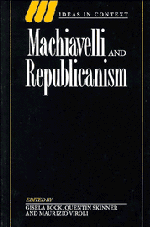Book contents
- Frontmatter
- Contents
- List of contributors
- Acknowledgements
- I MACHIAVELLI AND THE REPUBLICAN EXPERIENCE
- II MACHIAVELLI AND REPUBLICAN IDEAS
- III MACHIAVELLI AND THE REPUBLICAN HERITAGE
- 10 The Machiavellian moment and the Dutch Revolt: the rise of neostoicism and Dutch republicanism
- 11 Milton's republicanism and the tyranny of heaven
- 12 A controversial republican: Dutch views of Machiavelli in the seventeenth and eighteenth centuries
- 13 Montesquieu and the new republicanism
- IV THE MORALITY OF REPUBLICANISM
- Index
- Title in the series
10 - The Machiavellian moment and the Dutch Revolt: the rise of neostoicism and Dutch republicanism
Published online by Cambridge University Press: 05 July 2011
- Frontmatter
- Contents
- List of contributors
- Acknowledgements
- I MACHIAVELLI AND THE REPUBLICAN EXPERIENCE
- II MACHIAVELLI AND REPUBLICAN IDEAS
- III MACHIAVELLI AND THE REPUBLICAN HERITAGE
- 10 The Machiavellian moment and the Dutch Revolt: the rise of neostoicism and Dutch republicanism
- 11 Milton's republicanism and the tyranny of heaven
- 12 A controversial republican: Dutch views of Machiavelli in the seventeenth and eighteenth centuries
- 13 Montesquieu and the new republicanism
- IV THE MORALITY OF REPUBLICANISM
- Index
- Title in the series
Summary
In the first half of the sixteenth century, when their republic was starting to collapse, Florentine political theorists confronted the problem of the instability of their republic. As trained humanists, standing in the tradition of fifteenthcentury Florentine political thought, they conceptualised the fight for the stability of the republic in terms of a fight between virtù and fortuna, thus giving rise to a distinct republican political language. According to Pocock's analysis the republican language of the Machiavellian moment, with Machiavelli as one of the leading authors, has been of tremendous importance in the development of modern political thought in that it shaped an Atlantic republican tradition up to the American revolution.
In the second half of the sixteenth century the Low Countries were also faced with a collapse of their res publicae, during what is now called the Dutch Revolt. The decades of resistance to the government of Philip II, of his abjuration by the States-General in 1581, and of the haphazard foundation of the Dutch Republic have produced an impressive body of political literature. This article is a first attempt to study the relationship between the political thought of the Dutch Revolt (1555–90) and the ‘Machiavellian moment’. Its aim is briefly to reconstruct the development of Neostoic and republican patterns of ideas during the Revolt and to indicate their relation to the political language of the Machiavellian moment.
- Type
- Chapter
- Information
- Machiavelli and Republicanism , pp. 205 - 224Publisher: Cambridge University PressPrint publication year: 1991
- 4
- Cited by



